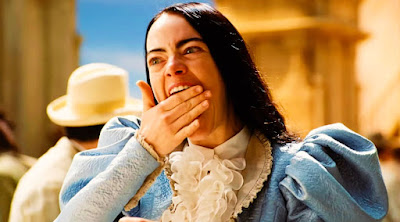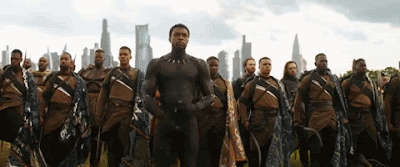or
"Go Ye Forth and Multiply"
Mickey Barnes (Robert Pattinson) has a sketchy past-he has an issue with a loan-shark-and so he wants to get off-planet as soon as possible. Fortunately, there's a private mission to the planet Niflheim that has been spear-headed by a former Senator Kenneth Marshall (Mark Ruffalo) to form a colony where he's the Supreme Leader (Marshall has lost his last two elections and no doubt wants to leave democracy behind). Mickey, seeing the long lines of potential volunteers for the exploration flight, volunteers to be an "expendable"--a low-level worker position that no one wants, mostly because the fine-print is egregious, saying that he can be assigned guinea-pig positions that will probably kill him, at which point he will be "re-printed" body and mind, his memories downloaded into the new Mickey. In the 4.5 years it takes to get to Niflheim, he's died and been re-manufactured 11 times. Once land-fall occurs, Micky dies a few more times testing the environment and the various vaccines for the planet's endemic diseases, before anyone else is allowed out in the glacial environment. And, at the time of the movie's start, he is Mickey 17.But, at the movie's start, that won't last long. 17's fallen into a crevasse in the freezing cold, nothing's broken, but there's no way he can get out. His co-hort from Earth, Timo (Steven Yeun), has a job as a pilot and he could rescue him from his predicament...but, hey, why bother? They're just going to make another one, anyway. He leaves with a genuine "Hey, nice knowing you. Have a nice death." And a question everyone asks, "Hey...what's it like to die?" After all, Mickey's had experience.I won't give too much away, but 17 survives the fall and the cold and is only too happy to get back to the base-camp where he gets a bit of a shock. Despite the lack of protocol and general laxity of safety conditions—especially in the science department—it seems they're very johnny-on-the-spot (or one should say Mickey-on-the-spot) for replacing their expendable: another Mickey has already been re-printed, who, of course, is Mickey 18. Because cloning is not an exact science, 18 is a bit more aggressive and less forgiving than his predecessor (hey, he's young, having only a few hours of life to his credit). But, the two have an immediate problem: duplicates are illegal in the colony and so, they it's a literal case of there not being room enough for the two of them, which makes both Mickeys beside themselves.One of them, then, has to go. Although they basically have the same brain, they are of two minds on the matter. 18, of course, says that because 17 is considered dead, he's overstayed his welcome and he needs to die; 17 considers 18 to be unnecessary and superfluous and so he should be the one to die. Neither one of them wants to have a twin—do they split their rations?—and, besides, Mickey 17 has a girlfriend, Nasha (Naomi Ackie), who's one of the base's security forces, and although she's intrigued with the possibilities, neither one of the Mickeys are into open relationships.The problem is, the question of who lives and who dies is out of all of their hands—duplicates are illegal and if it's one thing former Senator Marshall is consistent at it's in following the rules that he's put in place (and that's just about the only thing he's consistent about other than maintaining absolute power over the colony). This puts Nasha and the two Mickeys in conflict with the social order and their functions, but, hey, movies need conflict and there's quite a lot of it in Mickey 17.
It's clever, entertaining, and adaptor-director Bong Joon Ho (he of Parasite, Mother, and The Host) has created another of his intricate little "trap" movies where you wonder where he might be going with it, but it's less devious then his previous films, and suffers from a "Chekhov's gun" situation which makes the resolution of the film feel slightly telegraphed and less of a surprise than in previous work. There are a couple superfluous characters (besides the extra Mickey) and one sees a trope (let's be kind and call it "inspiration") from an early "Star Trek" episode that makes it seem overly-familiar. That's a slight disappointment. And he gets entertaining work from his cast—Pattinson plays dual roles, of course (actual multiple versions of the same character), and, dang, if you can't tell the two of them apart merely by his playing of them, and Ackie has never been more kinetic as she is here. Ruffalo and Toni Collette (playing Marshall's Lady MacBeth of a wife) play it broad, but then, the characters are broad, as most autocratic figures are before they fall into the self-destruction of self-parody.That broadness will, no doubt, raise hackles in some quarters, but those hackles are always on the alert, anyway. Best to look at the more subtle statement Mickey 17 is making about the irony of "essential workers" being regarded as the most disposable in business and governmental circles. Twas ever thus, whether it's in war, shirtwaist factories, or food-processing plants during a pandemic, this "dammit-I-can-have-it-both-ways" canard of the powerful sees far less exposure than it should. I'd like to see more of it, if only in the public interest.
The novel on which Mickey 17 is based has a sequel called "Antimatter Blues", but if it gets made into a movie, I'm sure they'll call it Mickey 19.
Wilhelm Alert @ 01:17:00































































